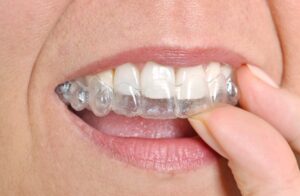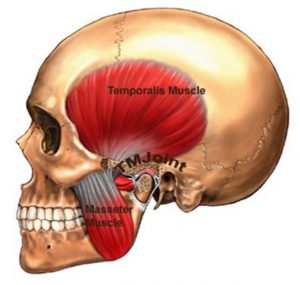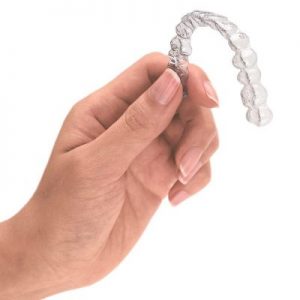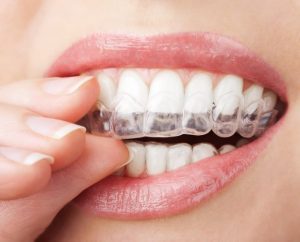What is the Difference Between a Night Guard and a TMJ Night Guard?
So, maybe you were told by your dentist that you need a night guard? Maybe they mentioned TMJ?
Maybe you even have chipped or broken teeth. What exactly is going on and do you really need one?
A night guard and a TMJ (Temporomandibular Joint) night guard serve similar purposes in terms of protecting your teeth, but they are designed to address different issues:
- Night Guard: A regular night guard, also known as an occlusal splint or dental splint, is primarily used to prevent teeth grinding or clenching during sleep. It is a custom-made or over-the-counter device that creates a barrier between your upper and lower teeth, reducing the impact of grinding or clenching forces. Night guards are often prescribed to prevent tooth wear caused by teeth grinding (bruxism).
- TMJ Night Guard: A TMJ night guard is specifically designed to address temporomandibular joint disorder or TMJ disorder. TMJ disorder can cause jaw pain, headaches, and other symptoms due to issues with the temporomandibular joint. A TMJ night guard is custom-fitted by a dentist and is aimed at helping the jaw muscles and joint relax by positioning the jaw in a more comfortable and stable position during sleep. It’s often recommended for individuals with diagnosed TMJ disorders.
In summary, while both types of guards are worn at night, a regular night guard focuses on protecting teeth from grinding, whereas a TMJ night guard is intended to alleviate symptoms related to TMJ disorders by providing proper jaw positioning and support. Night guard for TMJ can be a specialized option to ensure effective relief for those suffering from TMJ-related discomfort.
If you suspect you have a TMJ disorder or are experiencing symptoms, it’s essential to consult a dentist or TMJ specialist for a proper diagnosis and guidance on the most appropriate treatment, which may include a TMJ night guard.
Okay, But What is TMJ?
When it comes to temporomandibular joint dysfunction (TMJ), a person wants to take the disorder seriously. It occurs when the temporomandibular joints on both sides or one side of the mouth are in constant motion because the person is grinding one’s teeth at night.
These are the joints that connect the jaw to the skull via the muscles of mastication. Namely the Masseter, Temporalis and the Medial and Lateral Pterygoids. The muscles can go into spasm, get tight and cause TMJ pain.
Don’t think you grind your teeth at night? It is often done in the subconscious and most patients do not “know” they grind at night. What you really need is a mouth guard for TMJ, not a plain old dental night guard.
In fact an over the counter appliance that you get at CVS, like a boil and bite guard, will only exacerbate the problem. These devices are softened in hot water, placed in the mouth for a few minutes and then dunked in cold water.
You really need a custom fitted night guard made precisely on your upper teeth by a neuromuscular trained dentist. They are not a one size fits all. They are custom made to fit exactly your mouth.
How is TMJ Different from Bruxism?
TMJ or TMD not the same as bruxism. Bruxism just means a person clenches or grinds one’s teeth at night.
With TMJ, patients will experience pain in the area around the ear and whole side of the face and they will find it difficult to move their jaw. They might also suffer from pain in their ear, difficulty closing their mouth, headaches and trouble chewing normally.
Why does the whole side of my face hurt? It may feel like your wisdom teeth need to be removed, but actually it’s the muscles that control the jaw.
The muscles that control the jaw extend from the bottom of your jaw to half way up your skull.
See the picture to the right. This whole area can be sore and even painful.
What are the First Steps in Treatment?
Whether a person suffers from bruxism or TMJ, some of the end results can be the same.
Usually there is pain in the area of the ear, sometimes the patient gets headaches and most certainly there will be wear present on the teeth. Some patients will even have chipped and broken teeth.
Usually the wear is in the back molars and you cannot visibly see it. Only a dentist can.
Why you Should be Wearing a Dental Night Guard?
The first step in treating both of these conditions is to get a dental night guard made specifically for TMJ.
A custom night guard for TMJ, or also known as a dental splint or a bite splint, will help prevent the damage that is being done from teeth grinding and clenching.
To make this nocturnal bite plate, the dentist will take impressions of your teeth. One for the top and one for the bottom. They will also most likely take a interocclusal record known as a bite record. This tells the lab how the teeth meet together.
A mouth guard for TMJ usually only take a week to make at any laboratory. On the second visit the dentist will make sure that the guard fits properly.
Keep reading to find out how much a night guard cost.
Can’t I just buy one at the drug store? Yes, you can, but more than likely it will not relieve your jaw pain and may even make things worse.
Store brand mouth guards like the ones sold at CVS are soft plastic. Usually you boil them in hot water and then mold them to your teeth. Soft guards act a cushion for the teeth and tells the muscles to keep working, much like you are chewing gum. Muscles that are already in spasm then become overworked causing more pain and discomfort.
Could you Have Prevented this?
You might feel guilty if you are diagnosed with TMJ. And you might also feel a little confused. You might ask yourself- does this mean that you are grinding your teeth at night?
The answer to this question is maybe. Although even if you have bruxism, it might never develop into TMJ. Jaw pain itself might be making you clench your jaw more as well.
Other causes of TMJ are genetics, arthritis, or a jaw injury. It could also be a combination of all of the above factors. Only the dentist can figure out what is causing your TMJ.
I’ve Heard that I might Need Surgery
It might relieve you to know though that surgery is usually a last resort option and almost never occurs. Although surgery can be helpful in alleviating the problem, you can also try other avenues as well. It is important though to do something, because if you have problems also in your neck and upper back, then you can even begin to experience neck pain because of your TMJ.
An Occlusal TMJ Night Guard
If you are looking for the best night guard for TMJ then you want an occlusal splint.
An occlusal bite splint is a special mouth guard that fits in your mouth and shifts your lower jaw to a more natural positioning where your jaw joint and muscles are comfortable. This TMJ splint helps the muscles to relax gently.
You will mainly need to wear it when you sleep. The jaw muscles will eventually find a new position that causes a cessation of your pain. Sometimes, however, a patient will need to wear it every night to maintain the healing, even after the muscles have shifted.
Only a properly trained dentist, like Dr. Norkiewicz, can make an occlusal splint. He amassed over 100 hours in continuing education about the TMJ and how it interdigitates with the teeth.
This is a custom made device made from a processed acrylic resin. There are several types such as permissive, nonpermissive, hydrostatic, and soft rubber (silicone) splints. Only Dr. Norkiewicz will know which one will suit you best.
Night Guard Cost
How much does a dental night guard cost? These devices cannot be purchased over the counter.
Because they are custom made, the night guard cost is lower than the TMJ splint. Basically the night guard cost is around $800 – $1000.
A dental night guard can work well for some purposes, but when choosing the best bite splint for your TMJ, you will want to consult a dentist in Rockville Maryland.
The process is simple. The dentist takes an impression of your teeth and make a custom mold and a custom bite record. In a week your night guard is ready and will be lightly adjusted to fit your mouth.
When a person has serious problems, then the guard will need to be worn during the day as well as the night time. The dental night guard can be made of hard or soft material. Sometimes the harder night guards are made of a composite of two hard materials.
The main purpose of a custom night guard is to prevent clenching and grinding when one sleeps. They will help to protect the teeth from the damage that night time involuntary teeth grinding can cause. This is often an early sign of TMJ.
Conclusion
It is important for a person with concerns to see a TMJ specialist. The dentist will be able to assist in any questions that a person has about their teeth. Dr. Norkiewicz might be able to see if there is bruxism from the condition of the teeth. Additionally, he might be able to notice clicking of the jaw when performing the services.
It is vital to address concerns with a health care professional so that your TMJ problem does not get worse and get into a dental night guard. Catching TMJ on time can help to prevent a host of future health complications. Contact us to make an appointment. or call us at 301-424-2030.







